Morses Club PLC (LON:MCL) is the topic of conversation when Hardman and Co’s Analyst Mark Thomas caught up with DirectorsTalk for an exclusive interview.
Q1: Mark, Morses Club, you’ve called your note ‘Quality Street, why is that?
A1: To really get to know a company, you’ve got to understand its corporate culture and what we do in our note is we go through Morses Club’s focus on quality, giving practical examples of how the group can then generate sustainable profits by focussing on quality customers.
So, what we’ve got with MCL is that if you look at its lending, if you look at its agent network, if you look at the accounting, if you look at customer selection, if you look at new product development, all of those it focusses on quality and that’s really what investors are buying into.
So, we called it ‘Quality Street’ because it’s really getting into the quality culture of the business.
Q2: You mention a focus on quality loans, what does that mean for their home collect business?
A1: Home collect, by its nature, is a high-risk business so you will incur losses, that’s unavoidable, however, within that there are different tranches of risk within home collect.
What Morses Club is doing is focussing on customers who it thinks it’ll be comfortable re-lending too again and again and again, rather than just getting a big volume of new customers, where potentially it might only make one or two loans. 70% of customers are now in that category of MCL would re-lend to again and again and again, that’s actually up from 58% just 3 years ago. So, the quality of its lending is demonstrably improving.
Q3: You also say they are focussing on quality agents, what does that mean?
A3: With the agents, what we’re looking at is being very careful in who you select, home collect businesses are all about the middle-aged lady on the council estate going around and collecting money from who she knows will repay, if you move off that model very slightly, you end up with potentially very big losses.
What Morses Club did, when Provident Financial really disrupted its own agent network, is it focussed on those agents who were experienced with whom MCL could have a direct relationship, it didn’t go for agents who then had agents working for them, they have a relationship with every single agent. It focusses on picking those with experience that can really do a good job.
Q4: Can you give an example of its focus on quality in new product development?
A4: Yes, if you look at online lending losses, a number of financial institutions have entered this market, and what you see consistently is that they actually report losses, year in and year out and those losses can be very substantial.
What you saw with Morses Club is that they actually trialled a small business to it start with, bought an experienced platform and their losses in the last year are about one-twentieth of the level of say 118 188 Money or Likely Loans. It should be profitable within 3 years whereas some of these companies have been going year in and year out so that’s a new product, online lending, for MCL, the losses which they take on that business is materially lower than their peers.
Q5: Bottom line then, what does the focus on quality mean for the group?
A5: A focus on quality, sustainable business does mean it will sacrifice some growth in good market conditions, however, that’s mitigated by the advantages of a better quality franchise.
We believe MCL should face lower-than-average regulatory risk, a demonstrably low credit risk indicates a more appropriate product for its customer base, we think it’ll have a lower incremental funding strain and it will have lower customer acquisition costs. Perhaps most critically, a higher-quality franchise should see materially lower credit and earnings risk in an economic downturn.










































